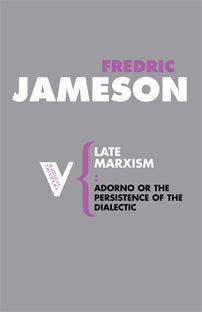Inevitable Negations
For the 10th instalment of our Jameson at 90 series, Clint Burnham revisits Fredric Jameson's Signatures of the Visible.

When I was an undergraduate at the University of Victoria on Canada’s West Coast in the 1980s, I would often read academic journals in the “Periodical Reading Room’; striking memories for me include coming across Jean Genet’s “Four Hours in Shatila” in the Journal of Palestinian Studies, an interview with Samuel R. Delany in diacritics, and Fred Jameson’s essay on postmodernism in New Left Review. What stayed with me about the pomo essay was the range of references: from literature and art to film and, specifically, the avant-garde poetry of the Language movement (the reading of Bob Perelman’s poem “China”). A few years later, when I was in the PhD program at York university in Toronto, knowing I was working on Jameson, the poet Daniel Jones ribbed me: “Jameson released three books this year, how can you keep up?” This was in 1990, and the books were the expanded Postmodernism, the book on Adorno, and Signatures of the Visible. It was Signatures, for me, that nailed Jameson as a film critic and theorist: not only for the bravura readings of The Godfather and Jaws and Dog Day Afternoon and Hitchcock (the latter is the secret sharer of Raymond Chandler in Jameson’s canon, I think), and the methodological question of reading over a disciplinary neighbor’s shoulder (referencing film criticism: of course, the irony is that, until recently, film studies itself suffered from an inferiority complex vis-à-vis English; the gutting of the humanities has ended that, perhaps) but also the long closing essay, “The Existence of Italy,” which established a formula for many of his books from the 1990s on; a collection of essays or articles accompanied by a more digressive, and discursive summa (the more obscure its title the better). The essay on The Godfather and Jaws has two virtues to my eye: first, it offers a dialectical theory of popular culture (Adorno versus the apologists, let’s say); second, we see an ideological reading of the gangster film where ecocide and the control of financialized violence are properly the narrative of capitalism itself (a “standing Hegel on his head” move I then inverted in my book on Jameson and The Wolf of Wall Street, reading the latter as less a film about finance, but more convincingly a mob picture); and the character study of the Dog Day Afternoon essay, which ends up being about questions of how to represent the working class that are still pertinent in today’s era of blue collar cosplay (from January 6 to Canada’s Freedom Convoy: Alberto Toscano has some pertinent readings of the “simulacra of class struggle” in his new book Late Fascism). In a fine passage, Jameson begins with overtones of what is now called the “dirtbag” or anti-woke left (associate with the Red Scare podcast but also the work of Adolph Reed/Walter Benn Michaels): “the categories of race and sex … are theoretically subordinate to the categories of social class, even where they may seem practically and politically a great deal more relevant,” but then argues that “we [must] allow for the dialectical possibility that even this fundamental ‘reality,’ may be ‘realer’ at some historical junctures than at others, and that the underlying object of our thoughts and representations – history and class structure – is itself as profoundly historical as our own capacity to grasp it” (pg. 37). To which we can only add the chiasmus-filigree that the apparent “reality” of such representations today constitutes the inevitable next negation.
See all works by Fredric Jameson here. His new book, Inventions of a Present: The Novel in its Crisis of Globalization is out on May 7.
[book-strip index="1"]


